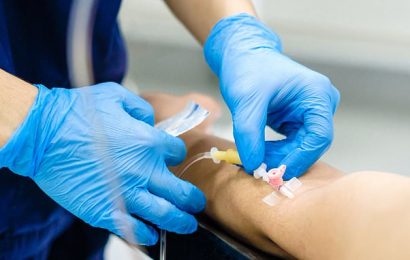
It’s been nearly 50 years since a group of researchers in Chicago reported an extraordinary finding: They’d created a vaccine against drug addiction and an early test showed it might work.
The scientists provided a rhesus monkey with drugs like heroin and cocaine; it became addicted. But when they injected the monkey with a compound they’d developed—one designed to coax the immune system into fighting addictive drugs as if they were pathogenic invaders—the animal stopped seeking drugs.
Their finding, published in the top scientific journal Nature in 1974, heralded a new frontier in treating addiction. But despite millions of dollars in research—and decades’ worth of studies, including a high-profile but failed attempt at a nicotine vaccine—there’s still no Food and Drug Administration-approved shot against any addictive substance.
Scientists at a new University of Washington research center hope that will soon change.
“What I’m hoping to achieve is pretty much every year, we’re going to start a new clinical trial,” said professor Marco Pravetoni, who was recently recruited from the University of Minnesota to lead UW’s new Center for Medication Development for Substance Use Disorders. The center, which has raised more than $2 million in initial funding, officially opened last week.
The investment comes as the number of overdose deaths in Washington has increased sharply: 1,855 Washingtonians died of drug-related deaths in 2020, up 33% from 1,399 the year before. Nationwide, more than 70,000 Americans died from drug-induced overdoses in 2019, according to the National Institute on Drug Abuse, nearly 50,000 of which were tied to opioids such as heroin, fentanyl and prescription drugs.
Public and scientific perspectives on the nature of addiction have changed over time. Once thought of as the result of personal moral failure, scientific advancements have shown addiction is instead driven primarily by genetic and environmental influences.
Currently, people seeking help with addiction can take medications like naltrexone, methadone and buprenorphine: These often life-changing medications prevent cravings, feelings of being high or both. For people addicted to opioids, medications like methadone and buprenorphine also dampen withdrawal symptoms.
But the medications also come with downsides. Methadone itself can be addictive. And such medications have to be taken regularly—every day or so—and require a prescription or visit to a specialized clinic.
Vaccines, on the other hand, hold long-lasting and potentially cost-effective promises that available medications don’t, experts say. Similar in nature to vaccines against disease, addiction vaccines stimulate the body to create antibodies that recognize a drug, and prevent or slow it from reaching the brain. A shot every few months, or once a year, has the potential to seriously ease a person’s path to recovery.
“[Existing medications] don’t work for everyone. And a lot of people don’t stay on them in the long term,” said Rebecca Baker, director of the National Institutes of Health’s Helping to End Addiction Long-term Initiative, which has funded Pravetoni’s work. “Would the outcomes be better if we had more options?” A vaccine, Baker said, could make treatment more accessible.
In animal studies, Pravetoni and other researchers have shown vaccines against a variety of drugs are safe and effective. Now, he and collaborators in New York and New Jersey are running the first-ever opioid vaccine trial in humans in the U.S.; they intend to enroll about 45 people to test a vaccine against oxycodone, a commonly abused prescription pain medication.
UW’s new center will build on this research and prior animal studies on other drugs like fentanyl and heroin, he said. But Pravetoni admits he’ll be up against the same challenges that have bedeviled addiction vaccine development for decades. Clinical trials in people are incredibly expensive—Pravetoni estimates it would take more than $200 million to $300 million to get a vaccine to market—and big pharmaceutical companies have shown little interest in chipping in.
“[Researchers] are trained to overcome adversity,” he said. “I don’t give up.”
Rocky road
Pravetoni’s early work involved researching the mechanisms behind the effects of drugs like methamphetamine and cocaine. He eventually decided he was more interested in developing medications, and under the training of Dr. Paul Pentel, a pioneer in nicotine cessation research, started working on a vaccine against nicotine addiction.
At the time, an addiction vaccine seemed “tantalizingly close,” as a New York Times article from Oct. 2011 described it.
The story featured work by Kim Janda, a chemistry and immunology professor at Scripps Research Institute in California. Back then, Janda had already spent nearly three decades at work on vaccines against addictive drugs.
But a nicotine vaccine never panned out: All clinical trials failed. Trials showed people who received a placebo quit smoking at the same rate as those who received a vaccine.
Janda was also studying opioids and tested vaccines in nonhuman primates. He licensed some technology to the biotech company Cessation Therapeutics, where he’s a board member, but didn’t attract the level of interest from large pharmaceutical companies or private investors he needed to test his vaccines in humans. Running clinical trials involving people addicted to drugs is expensive and logistically difficult, he said, and pharmaceutical companies didn’t see a clear path to financial returns.
Pravetoni said several valuable lessons still emerged from that early work. For one, the nicotine vaccines did seem to work in a subset of people, raising questions about whether someone’s biology might make some, but not others, good candidates for a vaccine. This finding continues to fascinate Pravetoni, who has since found certain biological indicators—like having high levels of a particular immune-related protein—predict who might benefit.
Secondly, nicotine posed its own set of challenges: Nicotine molecules are small. And because smokers often flood their body with nicotine by smoking several cigarettes a day, developing a vaccine that generates enough antibodies to notice so many nicotine molecules—and then block them—was difficult.
But a vaccine against more potent drugs like fentanyl, which requires a much smaller dose to feel the effect, might work better.
“We’ve learned a lot more [about] what is possible, what’s maybe not going to be as fruitful,” said Janda, noting that he doesn’t expect to see vaccines work against all drugs of abuse. “But if there’s enough money to put behind these vaccines, and you had the infrastructure to do it, then you could move it along fairly quickly.”
Fresh start
For the past decade or so, Pravetoni has led a laboratory of scientists in Minnesota dedicated to discovering vaccines and other substance use disorder medications.
Opioids interested him because some of them can be effective medications—but their effects can also be toxic; a single dose could kill someone. “I sort of felt I could have more of an immediate impact,” Pravetoni said.
This year, he and a Columbia University researcher launched the first Phase 1 clinical trial of an opioid vaccine. They’re studying the safety and efficacy of the vaccine, which is intended to stop the euphoric and dangerous effects of oxycodone. The vaccine is being tested in people who are already addicted and not being treated for substance use disorder; some participants will be given a placebo, while others will receive either a low or high dose of the vaccine.
If the vaccine works, Baker said she could imagine it being used by people who aren’t currently using drugs, such as those in prison or long-term treatment recovery programs who worry about relapsing when they’re released. Overdosing after release is a serious problem in Washington: A large study here found that in the two weeks after their release, formerly incarcerated people are 129 times more likely than the general population to die of a drug overdose.
Pravetoni and his colleagues also have about $50 million in funding for a future clinical trial to test a vaccine against fentanyl, and more funding to test vaccines against heroin and other drugs. Pravetoni says he hopes to enroll participants from Washington when those studies launch.
His goal, he said, is to get enough funding to get through at least Phase 1 and 2—prove his vaccines are safe and likely work—and then get a pharmaceutical company to fund the rest.
But Janda’s experience offers a cautionary tale, Pravetoni says. “He’s pretty famous, a pretty significant player,” said Pravetoni. “If he didn’t succeed in getting somebody on board as a commercial partner, that speaks volumes.”
Although the new UW research center will focus on vaccines to start, it will likely expand to other novel addiction therapies, said Jürgen Unützer, professor and chair of the department of psychiatry and behavioral sciences at the University of Washington School of Medicine. Once the center has hired more faculty and staff—Pravetoni is currently its sole faculty member—and has the capacity to run clinical trials, he envisions it as a translational research hub. Housed inside Harborview’s Research and Training building, the center will help translate the university’s notable basic science program into practical treatments, he said.
“We could look at other medications, for example,” Unützer said. “We have other addiction problems like methamphetamine addiction … and there are really virtually no treatments.”
Meanwhile, Janda has moved on to studying another category of addiction treatment: monoclonal antibodies, which are antibodies made in labs instead of inside the body, and when injected, zero in on targeted molecules to keep them at bay. Such a treatment is faster-acting than a vaccine and could prevent or reverse overdoses on drugs like fentanyl.
Source: Read Full Article


